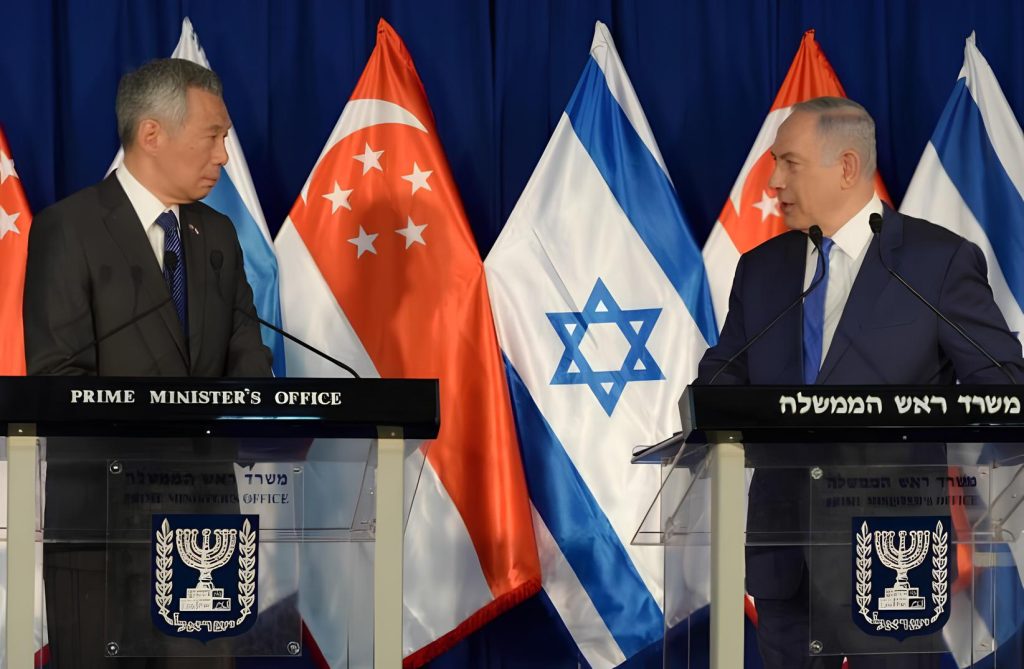








Israeli embassies face backlash for controversial social media posts and rhetoric, igniting diplomatic tensions with Singapore and Belgium.


Welcome back to Middle East Brief, where we take a look at the recent diplomatic tensions between Israel and its key strategic allies, sparked by controversial social media posts and rhetoric. From Singapore to Belgium, Israeli embassies have been at the center of criticism for departing from traditional diplomatic norms. These incidents have not only drawn international backlash but also raised concerns about the impact on Israel’s foreign relations. Today, we delve into these unfolding events and their broader implications for global diplomacy.
Recently, a diplomatic altercation unfolded between Israel and one of its key strategic allies in Asia, Singapore, prompted by a social media post on Facebook and X (formerly known as Twitter) by the Israeli Embassy in Singapore. The contentious post, published on Sunday, compared references to Israel and Palestine in the Qur’an, asserting a greater historical presence of the Jewish state in Palestinian territories than Palestine itself. This sparked significant outrage in Singapore, a diverse and multi-religious nation where Muslims constitute approximately 16% of the population, alongside a small Jewish minority of around 10,000 individuals.
Prompted by Singapore’s Home Minister K. Shanmugam’s condemnation, deeming the post an “astonishing attempt to re-write history” and “unacceptable from the perspective of safety and security,” the Israeli Embassy swiftly deleted the post, attributing its publication to an unauthorized individual and subsequent disciplinary measures were taken. Nonetheless, this incident reflects a recurrent pattern observed since October 7th, wherein Israeli embassies and top diplomats have departed from conventional diplomatic norms, engaging in provocative and polarizing rhetoric.
In Belgium, the Israeli Ambassador, Idit Rosenzweig-Abu, has drawn considerable criticism and international backlash for her confrontational diplomatic approach. Notably, her disregard for diplomatic decorum was evident in her response to the Belgian Foreign Ministry’s summons following the Israeli bombing of a building housing the Enabel Belgian development agency in Gaza. Ambassador Rosenzweig-Abu has made a series of controversial statements, including references to a Belgian serial killer when criticizing a newspaper’s publication of images juxtaposing Israeli and Palestinian prisoners upon their releases, eliciting censure from Belgian officials and victims’ families.
A recent incident further exacerbated tensions when Ambassador Rosenzweig-Abu, via X (formerly Twitter), lambasted the Belgian government for inviting a Muslim Imam to recite Quranic verses at a parliamentary event, disseminating erroneous information regarding the translation of the verses in Arabic, potentially constituting hate speech and sparking widespread outrage on social media.
Gilad Erdan, Israel’s Permanent Representative to the United Nations, affiliated with the Likud party led by Prime Minister Benjamin Netanyahu, has garnered significant international attention for his diplomatic actions. Erdan’s public wearing of yellow star badges inscribed with “Never Again” sparked criticism both abroad and domestically, including from Israel’s official Holocaust memorial, Yad Vashem. Additionally, Erdan faced scrutiny for his outspoken criticism of UN Secretary-General Antonio Guterres following Guterres’ acknowledgment of the historical context surrounding the October 7th attacks. Erdan called for Guterres’ resignation, accusing him of condoning terrorism. Further, Erdan’s aggressive remarks toward a UN Women spokesperson during a Security Council meeting led to interruption and reprimand from the Chinese Permanent Representative, emphasizing the importance of civility and respect in diplomatic discourse.
Written By: GABRIEL RAMIREZ
Written By: DILARA SAHIN
Written By: DILRUBA YILMAZ
Written By: NILAY CELIK
Written By: ELDANIZ GUSSEINOV
Written By: JOSEF SCHOEFL
Written By: SELCAN BEDIRHANOGLU
Written By: FATIH CEYLAN
FA’s flagship evening newsletter guilding you through the most important world streis ofthe day. Delivered weekdays.